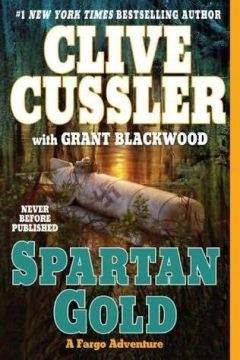“You’ve been across?” Napoleon asked.
“It’s quite sturdy. It’s rock beneath the ice. Still, you can’t be too safe.”
He secured the line first around Napoleon’s waist, then his own. Pelletier gave the knotted end a final tug and nodded to Laurent, who said, “Watch your footing, General,” then stepped into the tunnel. Napoleon waited a few moments, then followed.
They began inching their way across the crevasse. At the halfway point, Napoleon looked over the side and saw nothing but blackness, the translucent blue ice walls sloping into nowhere.
At last they reached the opposite side. They followed the next tunnel, which zigzagged for twenty feet, into another ice cavern, this one smaller than the first but with a high, arched ceiling. Lantern held before him, Laurent walked to the center of the cavern and stopped beside what looked like a pair of ice-covered stalagmites. Each one was twelve feet high and truncated at the top.
Napoleon stepped closer to one. Then stopped. He narrowed his eyes. It wasn’t a stalagmite, he realized, but a solid column of ice. He placed his palm against it and leaned his face closer.
Staring back at him was the golden face of a woman.
CHAPTER 1
GREAT POCOMOKE SWAMP, MARYLAND PRESENT DAY
Sam Fargo rose from his crouch and glanced over at his wife, who stood up to her waist in oozing black mud. Her bright yellow chest waders complemented her lustrous auburn hair. She sensed his gaze, turned to him, pursed her lips, and blew a wisp of hair from her cheek. “And just what are you smiling at, Fargo?” she asked.
When she’d first donned the waders he’d made the mistake of suggesting she looked like the Gorton’s Fisherman, which had earned him a withering stare. He’d hastily added “sexy” to the description, but to little effect.
“You,” he now replied. “You look beautiful—Longstreet.” When Remi was annoyed at him she called him by his last name; he always responded in kind with her maiden name.
She held up her arms, coated to the elbows in slime, then said with a barely concealed smile, “You’re crazy. My face is covered in mosquito bites, and my hair is flatter than paper.” She scratched her chin, leaving behind a dollop of mud.
“It simply adds to your charm.”
“Liar.”
Despite the look of disgust on her face, Sam knew Remi was a trouper without peer. Once she set her mind on a goal, no amount of discomfort would dissuade her.
“Well,” she said, “I have to admit, you do look rather dashing yourself.”
Sam tipped his tattered Panama hat at her, then went back to work, scooping mud from around a length of submerged wood he hoped was part of a chest.
For the past three days they’d been plodding through the swamp, searching for that one clue that might prove they weren’t on a wild-goose chase. Neither of them minded a good goose chase—in treasure hunting it came with the turf—but it was always better to catch the goose in the end.
In this case, the goose in question was based on an obscure legend. While the nearby Chesapeake and Delaware bays were said to be home of nearly four thousand shipwrecks, the prize Sam and Remi were after was land based. A month earlier Ted Frobisher, a fellow treasure hunter who’d retired not long ago to concentrate on his antique shop in Princess Anne, had sent them a brooch with an intriguing provenance.
The pear-shaped gold and jade brooch was said to have belonged to a local woman named Henrietta Bronson, one of the first victims of the notorious outlaw Martha “Patty” (a.k.a. Lucretia) Cannon.
According to legend Martha Cannon was a tough, ruthless woman who in the 1820s not only stalked the wilds of the Delaware-Maryland border with her gang, robbing and murdering the wealthy and poor alike, but who also ran a hostel in what was then called Johnson’s Corners, today Reliance.
Cannon would lure travelers into her establishment and feed, entertain, and tuck them in to bed before murdering them in the middle of the night. She would drag the bodies into the basement, take anything of value, then stack them in the corner like cordwood until she’d accumulated enough to warrant a wagon trip to a nearby forest, where she would bury them en masse. Horrific as that was, Cannon would later commit what many considered her most heinous crimes.
Cannon established what many local historians had dubbed a “reverse underground railroad,” kidnapping freed southern slaves and keeping them bound and gagged in the inn’s many secret rooms and its makeshift earthen dungeon before sneaking them in the dark of the night to Cannon’s Ferry, where they would be sold and loaded onto ships headed down the Nanticoke River bound for Georgia’s slave markets.
In 1829, while plowing a field on one of Cannon’s farms, a worker uncovered several partially decomposed bodies. Cannon was speedily indicted on four counts of murder, found guilty, and sentenced to prison. Four years later she died in her cell by what most agreed was suicide by arsenic.
In subsequent years both Cannon’s crimes and her ultimate demise grew in myth, ranging from the claim that Cannon had escaped from prison and went on murdering and robbing far into her nineties, to tales that have her ghost still roaming the Delmarva Peninsula, waylaying unsuspecting hikers. What few people disputed was that Cannon’s loot—of which she’d reportedly spent only a fraction—had never been recovered. Estimates put the treasure’s present-day value somewhere between $100,000 and $400,000.
Sam and Remi had of course heard the legend of Patty Cannon’s treasure, but lacking solid leads they’d consigned it to the “someday” file. With the emergence of Henrietta Bronson’s brooch and an exact datum with which to begin their search, they’d decided to tackle the mystery.
After a detailed study of the Pocomoke’s historical topography and mapping Cannon’s alleged hideouts in comparison to where the brooch had been found, they’d narrowed their search grid to a two-square-mile area, most of which lay deep within the swamp, a labyrinth of moss-draped cypress trees and brush-choked bogs. According to their research this area, which in the 1820s had been dry ground, had been home to one of Cannon’s hideouts, a tumble-down shack.
Their interest in Cannon’s treasure had nothing to do with the money—at least not for their own benefit. Upon first hearing the story, Sam and Remi agreed if they were ever lucky enough to find the treasure, the bulk of the proceeds would go to the National Underground Railroad Freedom Center in Cincinnati, Ohio, an irony they felt sure would outrage Cannon if she were still alive. Or, if they were lucky, it would outrage her ghost.
“Remi, what was that poem . . . the one about Cannon?” Sam called. Remi had a near-photographic memory for details, both obscure and pertinent.
She thought for a moment, then recited:
“Hush your mouth
Go to sleep
Old Patty Ridenour take you back deep
Got a gang of seven
Taking slave and free
Riding day and night
On her coal-black steed.”
“That’s it,” Sam replied.
Around them the exposed roots of the cypress trees jutted from the water like disembodied talons of some great winged dinosaur. The previous week a storm had blown across the peninsula, leaving behind mounds of branches like hastily constructed beaver dams. Overhead, the canopy was alive with a symphony of squawks and buzzes and fluttering wings. Occasionally Sam, a part-time bird-watcher, would isolate a trilling and announce the bird’s name to Remi, who would humor him with a smile and a “That’s very nice.”
Sam found the exercise helped his “by ear” piano playing, something he’d picked up from his mother. For her part, Remi had a nice touch with the violin, which she put to good use during their frequent impromptu duets.
Despite his engineering background, Sam was an intuitive, right-brain thinker, while Remi, a Boston College-trained anthropologist /historian, was firmly grounded in logical, left-brain thinking. While the dichotomy made them a balanced, loving pair, it also led to vigorous debates, ranging in topic from what had started the English Reformation to which actor made the best James Bond to how to best play Vivaldi’s concerto Summer. Most often the debates ended in laughter and an ongoing but good-natured disagreement.
Bent at the waist, Sam probed underwater with his fingers, sliding along the wood until he touched something metal . . . something with a U-shaped hasp and a square body.
A padlock, he thought, visions of an ancient barnacle-encrusted hasp swirling through his mind. “Got something,” he announced.
Remi turned toward him, muddy arms hanging by her sides.
“Hah!” Sam pulled it from the water. As the mud slid off and plopped back into the water, he saw the glint of rust and silver, then some raised letters. . . .
M-A-S-T-E-R L-O-C-K.
“Well?” Remi said, her voice tinged with skepticism. She was used to Sam’s sometimes premature excitement.
“I’ve found, my dear, a vintage Master padlock, circa 1970,” he replied, then hefted from the water the piece of wood it had been attached to. “Along with what looks like an old gatepost.” He dropped it back into the water and then straightened up with a groan.
Remi smiled at him. “My intrepid treasure hunter. Well, it’s more than I’ve found.”
Sam looked at his watch, a Timex Expedition he wore only on expeditions. “Six o’clock,” he said. “Shall we call it a day?”
Remi ran her cupped hand down her opposite forearm, shedding a layer of goop, and gave him a broad smile. “Thought you’d never ask.”
They gathered their packs and hiked the half mile back to their skiff, which they’d tied to a grounded cypress stump. Sam cast off and pushed the boat into deeper water, wading up to his waist, while Remi yanked the engine’s starter cord. The motor growled to life and Sam climbed in.
She turned the bow into the channel and throttled up. The nearest town and their base of operations was Snow Hill, three miles up the Pocomoke River. The B&B they’d chosen had a surprisingly decent wine cellar and a crab bisque that had put Remi in culinary heaven at the previous night’s supper.
They motored along in silence, lulled by the soft gurgle of the motor and gazing at the overhanging canopy. Suddenly Sam turned in his seat, looking to the right.
“Remi, slow down.”
She throttled back. “What is it?”
He grabbed a pair of binoculars from his pack and raised them to his eyes. Fifty yards away on the bank there was a gap in the foliage—another hidden inlet among the dozens they’d already seen. The entrance was partially blocked by a tangle of branches piled up by the storm.
“What do you see?” she asked.
“Something . . . I don’t know,” he muttered. “I thought I saw a line in the foliage . . . a curve or something. Didn’t look natural. Can you get me over there?”
She turned the rudder and aimed the skiff at the mouth of the inlet. “Sam, are you hallucinating? Did you drink enough water today?”
He nodded, his attention fixed on the inlet. “More than enough.”
With a soft crunch, the skiff’s nose bumped into the mound of branches. The inlet was wider than it looked, nearly fifty feet across. Sam looped the bow line around one of the larger limbs, then slipped his legs over the gunwale and rolled into the water.
“Sam, what’re you doing?”
“I’ll be right back. Stay here.”
“Like hell.”
Before she could say more, Sam took a breath, ducked underwater, and disappeared. Twenty seconds later Remi heard a splash on the other side of the branches, followed by Sam sucking in a lungful of air.
She called, “Sam, are you—”
“I’m fine. Be back in a minute.”
One minute turned into two, then three. Finally Sam called through the foliage, “Remi, can you join me, please?”
She could hear the mischievous lilt in his voice, and thought, Oh, boy. She loved her husband’s adventurous impulses, but she’d already started imagining how good a hot shower was going to feel. “What is it?” she asked.
“I need you to come here.”
“Sam, I just now started to dry off. Can’t you—”
“No, you’re going to want to see this. Trust me.”
Remi sighed, then slipped over the side into the water. Ten seconds later she was treading water beside him. The trees on either side of the inlet formed an almost solid canopy over the water, enclosing them in a tunnel of green. Here and there sunlight stippled the algae-filmed surface.
“Hi, nice of you to come,” he said with a grin and a peck on her cheek.
“Okay, smarty-pants, what are we—”
He rapped his knuckles against the misshapen log he had his arm draped over, but instead of a dull thud she heard a metallic gong.
“What is that?”
“Not sure yet. Part of it—can’t be sure what part until I get down there and get inside.”
“Part of what? Get inside what?”
“This way, come on.”
Taking her by the hand, Sam sidestroked deeper into the inlet and around a corner, where the course narrowed to twenty feet. He stopped and pointed to a vine-covered cypress trunk near the bank. “There. You see it?”
She squinted, tilted her head left, then right. “No. What am I looking for?”
“That branch sticking out of the water, the one that ends in a T shape. . . .”
“Okay, I see it.”
“Look harder. Squint. It helps.”
She did, narrowing her eyes until slowly what she was seeing registered on her brain. She gasped. “Good Lord, is that a . . . It can’t be.”
Grinning from ear to ear, Sam nodded. “Yep. It is. That, my dear, is a submarine’s periscope.”
CHAPTER 2
SEVASTOPOL, UKRAINE
Hadeon Bondaruk stood at the floor-to-ceiling windows of his study and stared out at the Black Sea. His study was dark, lit only by dimmed ceiling lights that cast soft pools into the corners of the room. Night had fallen over the Crimean Peninsula, but to the west, over the Romanian and Bulgarian coasts, backlit by the last remnants of the setting sun, he could see a line of storm clouds moving north over the water. Every few seconds the clouds would pulse from within, shooting veins of lightning across the horizon. It would be here within the hour, and God help those foolish enough to be caught afloat in the midst of a Black Sea storm.
Or, Bondaruk thought, God not help them. No matter. Storms and disease and yes, even war, were nature’s way of culling the herd. He had little patience for people who didn’t have the sense or strength to protect themselves against the violence of life. It was a lesson he’d learned as a boy, and one that he’d never forgotten.





